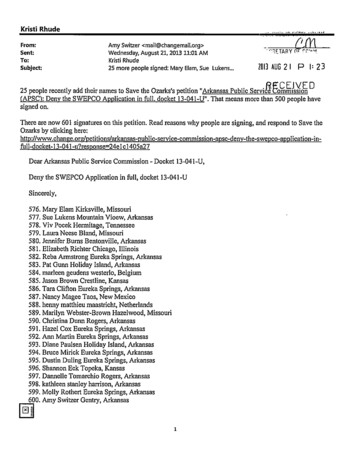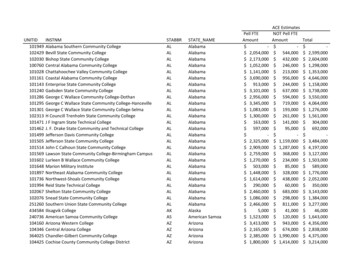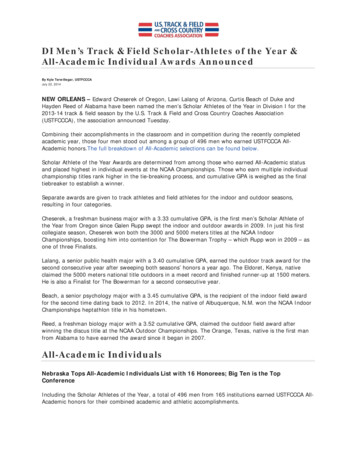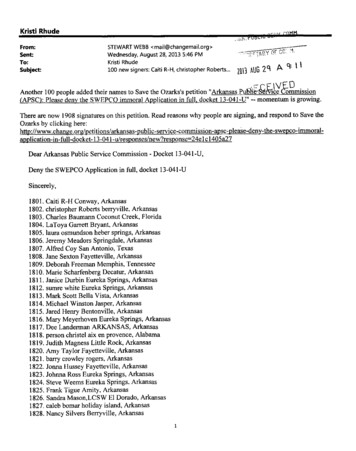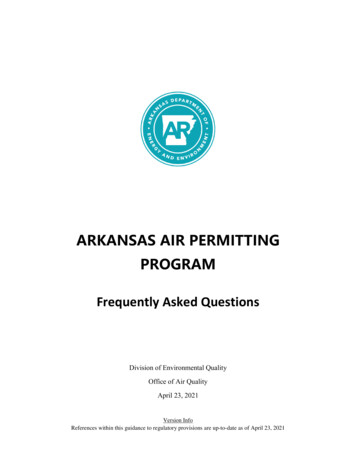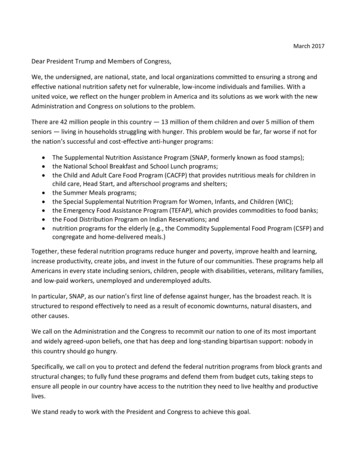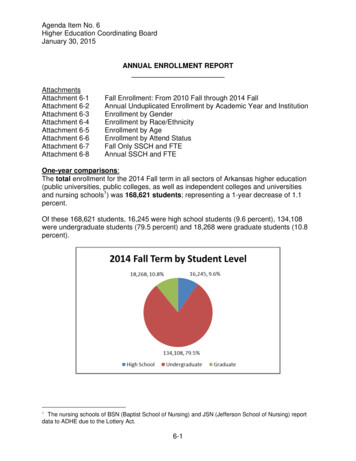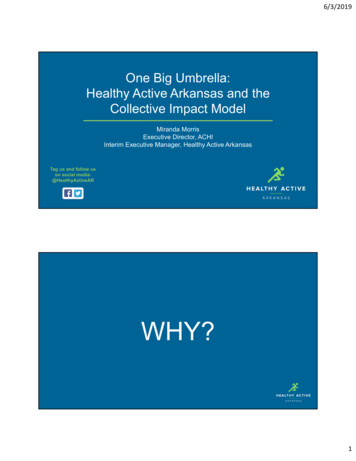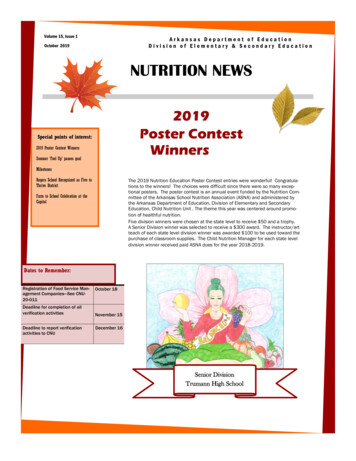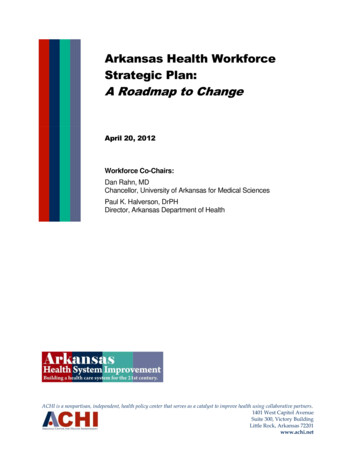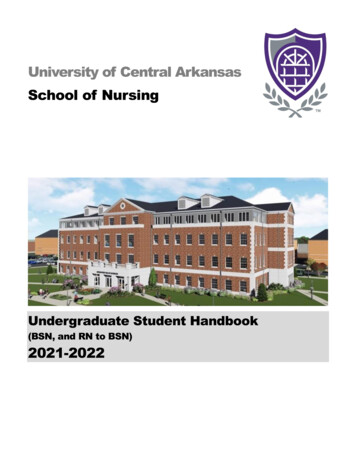
Transcription
University of Central ArkansasSchool of NursingUndergraduate Student Handbook(BSN, and RN to BSN)2021-2022
Welcome from the DirectorIt is my pleasure to welcome you to the University of Central Arkansas'School of Nursing. Commitment to excellence in nursing education andstudent success is our primary mission. Explore this handbook and ourwebsite to learn more about our programs and activities – let us helpyou achieve your professional goals. Dr. Susan Gatto, PhD, RNWelcome from the Undergraduate Program CoordinatorCongratulations on your entry into the University of Central Arkansas- School of Nursing. You are entering an exciting time in the deliveryof healthcare in Arkansas and throughout the nation, and yourexperiences with us will provide the knowledge, skills, and abilities tolead the way. Dr. Julie Meaux, PhD, RN, CNE, FNAPUniversity of Central ArkansasSchool of Nursing201 Donaghey AvenueConway, Arkansas 72035Phone 501-450-5519 Fax 501-450-5560i
About this HandbookThe Undergraduate Nursing Student Handbook contains policies and procedures forstudents in the Bachelor of Science in Nursing (BSN) programs (prelicensure BSN, andRN to BSN).This is one of several official UCA publications you need as a UCA student. Thesepublications contain rules, regulations, and policies that apply to all UCA students. The University of Central Arkansas Undergraduate Bulletin UCA Student Handbook UCA Police Department Policies and RegulationsThe current edition of this handbook should be referred to throughout this academicyear. The information in this handbook in no way exempts you from therequirements of the University as found in the other official publications.Policies and procedures change over time. Changes in such vital areas as curriculumor requirements for graduation will not be made retroactively unless they are to thestudents’ advantage and can be accommodated within the remaining time beforegraduation. Policy revisions made after July 2021 will be disseminated to students viaUCA Gmail.The UCA School of Nursing Undergraduate Student Handbook is updated everyyear and students are accountable to policies herein and revisions that have been sentby UCA Gmail.
Table of ContentsWelcome from the Director . iWelcome from the Undergraduate Program Coordinator . iiTable of Contents . iiiUCA School of Nursing . 1History . 1Mission and Philosophy . 2Accreditation . 3Faculty and Staff . 3ANA Code of Ethics for Nurses. 4Baccalaureate of Science in Nursing (BSN) - ProgramInformation . 5Conceptual Framework . 5Program Outcomes – . 5On Campus - BSN Tracks . 6Online Tracks. 7Instructional Methods . 7Program Admission Requirements . 9Abilities and Skills for Admission and Progression in Nursing . 9Prelicensure BSN Admission Criteria (Summer II admission only) . 11RN to BSN Admission Criteria (Fall, Spring, or Summer Admission) . 12New Student Requirements . 13Student Advising and Registration . 18Course Scheduling for Prelicensure Students . 18Course Scheduling for BSN Completion Students . 188Returning to the Nursing Program after interruption in plan of study . 19Course Cancellation . 19Nursing Honors Program . 19Special Studies/Elective Courses in Nursing . 19Degree Completion . 19Academic Policies . 20Blackboard Course Management System . 20Academic Integrity . 20Academic Misconduct and Plagiarism . 20Honor Commitment . 21Academic Program Progression . 22Course Failures . 22
Course or University Withdrawals . 22Withdrawal from Blocked Courses .Error! Bookmark not defined.22Clinical Failure . 23Readmission after course/clinical failure . 23Appeal Procedures . 23Formal Complaint . 24Attendance. 24Testing Policies. 25Inclement Weather. 26Grading Scale . 27Student Responsibilities and Behavior . 28Name and Address Change. 28Electronic Communication . 28Public Disclosure of Information . 28Confidentiality and HIPAA. 29Attendance Required at Professional Meetings (Prelicensure BSN) . 29Professional Boundaries . 29Recording of Classes and Distribution of Course Materials by Students . 30Criminal Charges . 30Substance Abuse Policy . 31Social Media . 34Job Reference and Recommendation Letter Etiquette . 35Employment . 36Inclement Weather. 36Professional Behaviors . 37STUDENT CLINICAL EXPERIENCE AND SIMULATION . 39Clinical Experiences . 39Arkansas Student Passport . 39Nabholz Center for Healthcare Simulation . 40Release of Student Information to Clinical Agencies . 40Transportation. 40Clinical Legal Documents (RN to BSN) . 40CLINICAL EVALUATIONS . 41Uniform Policy (Prelicensure BSN) . 41Dress Code (RN to BSN) . 43Infection Control Precautions . 44Blood, Body Fluid, and Hazardous Exposure Policy and Protocol . 45Patient/Client Records/Reports/Assignments . 46
Student Errors, Near Misses, and Deficiencies in Clinical and SimulationLaboratory. 47RESEARCH AND SCHOLARSHIP . 48Protection of Human Subjects . 48Student Participation in Program Evaluation and Research . 48Professional Organizations and Committees . 49School of Nursing Committees . 49National Student Nurses’ Association (NSNA) and Arkansas State NursingStudent Association (ASNSA) and UCA Nursing Student Association(UCA NSA) . 49Sigma Theta Tau International Honor Society of Nursing . 49UCA Alumni Chapter . 50GRADUATION AND LICENSURE. 51Criminal Background and RN Licensure . 51School of Nursing Pin . 51Application for Graduation . 51Convocation . 51NCLEX-RN Exam, Application . 51NCLEX-RN Verification of Degree Policy . 52Expenses Prior to and After Graduation . 52AWARDS AND SCHOLARSHIPS . 53Outstanding Undergraduate Student Award . 53Undergraduate Academic Excellence Award . 53Undergraduate Clinical Excellence Award . 53Spirit of Nursing Award . 54Ashcraft Nursing Scholarship. 54Barbara Harpe Nabholz Nursing Scholarship . 54Crystal V. Crawford Scholarship . 54Clara Forsberg Nursing Scholarship . 55Enda and Edward Vail Scholarship. 55Lauretta Koenigseder Nursing Scholarship . 55Martin Nursing Scholarship . 55Others: . 55Appendix A - Program Outcomes mapped to Level Objectives. 56Appendix B – Intent to Return to the Nursing Major. 67Appendix C - Clinical Deficiency and Remediation Forms . 69Appendix D – Scholarship Applications . 73
Appendix E – Integration Plan for Standardized Exam 20192020 . 78APPENDIX F - Arkansas State Board Policies on CriminalBackgrounds
Chapter1UCA School of NursingHistoryThe School of Nursing was established in the spring of 1967 after the closure the baccalaureatenursing program at Ouachita Baptist College in Arkadelphia. The Ouachita Baptist Collegeprogram was in existence for two years after replacing Little Rock's Baptist Medical System'sdiploma school of nursing.In order to provide a continuation of education for the enrolled students, numbering more than 100,UCA (then State College of Arkansas) was asked to initiate a nursing program and accept the nursingstudents from Ouachita. The first class of 26 baccalaureate students graduated in the spring of 1969.The UCA School of Nursing was established with funding assistance from the city of Conway and byGovernor Winthrop Rockefeller. The School of Nursing has been an integral part of the university'sacademic community since its inception. It has consistently received the administrative support andcooperation required to sustain quality undergraduate and graduate programs.The BSN program received its initial National League for Nursing (NLN) accreditation in 1969.In keeping with the historical role of UCA as an institution for the preparation of teachers, agraduate program in nursing education (MSE) was established in 1970. In 1977, the graduateprogram was revised to offer a Master of Science in Nursing (MSN) degree. The MSN programwas granted initial NLN accreditation in the fall of 1982. In 2014, the Doctor of Nursing Practiceprogram received approval from the Higher Learning Commission and admitted the first cohortof DNP students. Full accreditation of the DNP program was awarded in 2015.In 2016, the UCA Department of Nursing officially became the UCA School of Nursing and theNabholz Center for Healthcare Simulation was established.Back1
Mission and PhilosophyMission - The School of Nursing is committed to educating students at the undergraduate andgraduate levels as leaders in the delivery of quality healthcare and advancement of the nursingprofession.Philosophy - Excellence in nursing education is achieved through dedicated nursing facultyand their ongoing commitment to teaching/learning, student success, scholarship, and serviceto the community. The process of learning involves student-teacher partnerships andcooperation in meeting student and program goals. The nursing faculty serves as role modelswho guide students in developing an understanding of the discipline and in developingleadership, accountability, cultural competence, safe and ethical practice, and interdisciplinarycollaboration. Learning is a life-long endeavor that fosters intellectual and personal growththrough critical thinking, active inquiry and creative endeavors. Profession: Nursing is a professional discipline concerned with meeting the healthneeds of a diverse and changing society. As a profession, nursing is legally andethically accountable to society for the integrity and outcomes of its practice.Professional nursing is an art and a science grounded in general education and derivedfrom the synthesis of empirical knowledge, aesthetics, personal knowledge, and ethics.Nursing knowledge is built through scholarly inquiry and study, self-reflection, and avariety of clinical and professional experiences. Practice: Nursing practice includes direct and indirect care, prevention and treatmentof disease and illness, management of symptoms, and promotion of the health andwell-being of self, individuals, families, groups, communities, and populations.Professional nursing practice requires the acquisition of knowledge, competencies andvalues; role development; self-awareness; and acceptance of sociopolitical, ethical andprofessional responsibilities. Caring is fundamental to nursing and encompasses thecharacteristics of empathy, compassion, sensitivity, and the ability to connect withpatients with thoughtful attention to patients’ needs, interests, and values. People: Nurses believe people are holistic beings with inherent dignity and worth whohave the right and responsibility to participate in decisions that affect their health.Health is a dynamic state of physical, spiritual, emotional and psychosocial being,affected by genetics, environmental factors, personal behaviors, and abilities to adaptin a rapidly evolving environment. Health is expressed in terms of perceived wellnessand illness, both of which can occur in the presence or absence of disease.Back2
AccreditationThe baccalaureate degree program in nursing, master’s degree program in nursing, Doctor of NursingPractice program and the post-graduate APRN certificate program at the University of Central Arkansas,School of Nursing is accredited by the Commission on Collegiate Nursing Education, 655 K. Street, NW,Suite 750, Washington, DC 20001, 202-887-6791. Programs are fully approved by the Arkansas StateBoard of Nursing.Faculty and StaffFaculty & AdministratorsSusan Gatto, PhD, RNDirectorJulie Meaux, PhD, RNUndergraduate Program CoordinatorStacy Harris, DNP, APRNGraduate Program CoordinatorPam Ashcraft, PhD, RNScholarship and Research CoordinatorFull-Time FacultyJacob Baker, MSN, RN – Sim.ManagerAmanda Beaver MSN, RNLeslie Blackwell, MSN, RNPenny Dodson, DNP, RNTraci Elliff, MSN, APRNJanet Fletcher, MSN, RNErin Garrett, MSN, RNAnnette Gartman, MSN, RNLaura Gillis, DNP, RNRebecca Gray, MSN, APRNKeitha Griffith, DNP, RNMyra Grantham, MSN, APRNLaura Hall, DNP, RNKerry Jordan, PhD, APRNHolly Langster, DNP, APRNSandie Nadelson, PhD, RNKelly Quinn, MSN, RNAndrea Taylor-Garza, MSN, RNAllison Tucker, MSN, RNEmily Ward, MSN, RNBrandis Wheat, MSN, APRNEducational CounselorsAmanda Abramovitz, MAJessica Burks, MATachia AwbreyAdministrative SpecialistsCandice Ashcraft – Office ManagerVacantSimulation Operation SpecialistSarah Luyet, BSOfficePhoneEmailIHS 496501-450-5531susang@uca.eduIHS uca.eduIHS 405IHS 430IHS 489IHS 492IHS 404IHS 429IHS 406IHS 411IHS 432IHS 431IHS 407IHS 413IHS 490IHS 491IHS 414IHS 427IHS 444IHS 433IHS 440IHS uca.eduSnadelson1@uca.edukquinn@uca.eduIHS 488IHS 484IHS rks@uca.edutawbrey@uca.eduIHS 498IHS 435501-450-5518501-450-3119candicea@uca.eduIHS 356501-852-2440sluyet@uca.eduIHS 409IHS 415IHS .edu
ANA Code of Ethics for NursesEach student is to adhere to the values and ethics expressed in the ANA Code of Ethics for Nurseswith Interpretive Statements (2015) The Code can be viewed and purchased online.1. The nurse, in all professional relationships, practices with compassion and respect for theinherent dignity, worth and uniqueness of every individual, unrestricted by considerations ofsocial or economic status, personal attributes, or the nature of health problems.2. The nurse's primary commitment is to the patient/client, whether an individual, family, group,or community.3. The nurse promotes, advocates for, and strives to protect the health, safety, and rights of thepatient/client.4. The nurse is responsible and accountable for individual nursing practice and determines theappropriate delegation of tasks consistent with the nurse's obligation to provide optimumpatient/client care.5. The nurse owes the same duties to self as to others, including the responsibility to preserveintegrity and safety, to maintain competence, and to continue personal and professionalgrowth.6. The nurse participates in establishing, maintaining, and improving healthcare environments andconditions of employment conducive to the provision of quality healthcare and consistent withthe values of the profession through individual and collective action.7. The nurse participates in the advancement of the profession through contributions to practice,education, administration, and knowledge development.8. The nurse collaborates with other health professionals and the public in promoting community,national, and international efforts to meet health needs.9. The profession of nursing, as represented by associations and their members, is responsible forarticulating nursing values, for maintaining the integrity of the profession and its practice, andfor shaping social policy.Back4
Chapter2Baccalaureate of Science in Nursing (BSN) Program InformationThe baccalaureate of science in nursing (BSN) degree prepares nurses for a wide variety of professionalroles and graduate study. Course work includes nursing science, research, leadership, and relatedsciences that inform the practice of nursing. It also provides the student with general education in math,humanities and social sciences. UCA offers a prelicensure BSN program for students who are not yetlicensed. In addition, articulation options are available for licensed RN’s to complete the BSN degree.Conceptual FrameworkThe conceptual framework for the BSN program is the Essentials of Baccalaureate Education forProfessional Nursing Practice, (American Association of Colleges of Nurses (AACN), 2008).Adopted by Faculty Organization: 2009Program Outcomes –1. Critical Inquiry – the ability to analyze new problems and situations to formulate informedopinions and conclusions.2. Communication – The ability to develop and present ideas logically and effectively in order toenhance communication and collaboration among diverse individuals and groups.3. Responsible Living – The ability to address real-world problems and find ethical solutions forindividuals and society.4. Diversity – The ability to analyze familiar cultural assumptions in the context of the world’sdiverse values, traditions, and belief systems, as well as to analyze the major ideas, techniques,and processes that inform creative works within different cultural and historical contexts.5. Collaboration – a complex partnership that occurs over time that allows effective functioningof nursing and Interprofessional teams, and fosters open communication, mutual respect, andshared decision-making to achieve quality outcomes.5
6. Professional practice – competency in the professional role as care provider; designer, manager,or coordinator of care; and a member of the profession.The BSN curriculum is designed to enable students to achieve program outcomes. Level objectives are used to guide coursework and activities at each level of the BSN curriculum. Level objectives for Juniors and Seniors can be found in Appendix A.On Campus - BSN TracksPrelicensure BSN TrackThe prelicensure BSN track is designed for students who do not yet hold a nursing license. Theprelicensure BSN track includes traditional face-to-face classes and online classes. Clinicalexperiences range from simulated learning in the Nabholz Center for Healthcare Simulation,virtual clinical experiences, and clinical experiences in a variety of central Arkansas healthcareagencies, institutions, and communities. Upon successful completion of the program, the studentis awarded a Bachelor of Science in Nursing (BSN) degree and is eligible to apply to take theRegistered Nurse (RN) licensing examination (NCLEX-RN).Prelicensure BSN - Plan of StudyThe prelicensure BSN track requires a total of 120 semester credit hours, including at least 40upper-division credit hours. The academic requirements or “Academic Map” can be found on theUCA website at: rs-bsn-4yr.pdfTuition and Fees for Prelicensure Nursing StudentsThe Student Accounts/Cashier’s Office is located in Bernard Hall Suite 110. (501) 450-5015.www.uca.edu/studentaccountsUCA’s mission is to professionally assist students, parents, and third party agencies through thepayment process and serve as the main monetary collection point for the University. We strive tooffer the best possible service consistent with policies and regulations. We provide information,assistance, and education to students and parents so that they can fully understand the cost ofattending the University, the dates when these costs are due, and methods for paying the costs.Specific information can be accessed via personal contact, our website, myUCA, the studenthandbook, the undergraduate and graduate bulletins, and invoices. The dates, times and instructionsfor paying fees are extremely important to avoid monthly late payment charges.The current tuition and fees can be found at es/.As a nursing student, you will be charged the following fees, in addition to other university fees:1. A College of Health and Behavioral Sciences fee is assessed for all health science majors, includingnursing, physical therapy, occupational therapy, and speech pathology due to the higher costs ofthese programs. Some of the revenue comes to the program to assist in obtaining faculty, somegoes into the general revenue of the university to cover malpractice insurance, and some goes to thelibrary for books and periodicals in the health fields.2. A Nursing Assessment fee is required for all nursing courses. This fee pays for testing programsand standardized tests used throughout the curriculum.6
3. A Nursing Technology and Lab fee is assessed for all nursing courses and is used to purchase andupdate equipment used in the nursing simulation lab and classrooms.4. Go to the School of Nursing website for specific amount of the above fees.http://uca.edu/nursing/special-fees/.Online TracksRN to BSN TrackOnline programs have rapidly become commonplace in Universities, encouraging workingprofessionals to pursue further education. Online courses have a flexible component not found in thetraditional face-to-face classroom. However, students should expect to devote the same amount of timefor online courses as they would for face-to-face courses. For each 3-credit course, the student shouldbe prepared to devote 12-15 hours per week for course activities.The RN-to-BSN track is for Registered Nurses (RNs) who are graduates of an accreditedassociate degree or hospital diploma program and seek a Bachelor of Science in Nursing (BSN)degree. Qualified RNs receive 41 hours of BSN nursing credit based on their prior educationalprogram. RN to BSN courses are delivered completely online. The Leadership and CommunityHealth courses also require practicum experiences that the student completes near their homelocation. The purpose of the practicum experience is to allow students to demonstrateachievement of required BSN competencies. Practicum experiences are required of all programsaccredited by the Commission on Collegiate Nursing Education.RN to BSN Plan of StudyThe RN to BSN track can be completed in 12 months. Curriculum patterns for the RN to BSNfull-time or part-time study can be found at: uition for Online Undergraduate ProgramsBoard policy 630 (Updated May 2017): Undergraduate fully online program 285/semester credit hour.Instructional MethodsThe UCA School of Nursing uses innovative instructional methods to facilitate learning that mayinclude face-to-face experiences in the traditional classroom setting, online learning, experiencesin the Nabholz Center for Healthcare Simulation, and clinical experiences in various healthcareand community agencies located throughout Arkansas. These innovative approaches areintentionally placed into our degree programs and are a vital part of our student learningexperiences.7
Traditional Classrooms (prelicensure BSN)Prelicensure students have coursework in traditional classrooms that are equipped with projectors,computers, and media players. Faculty members use technology and other teaching strategies topromote student engagement and active learning.Online Learning (all BSN tracks)The Blackboard learning management system is used to augment classroom instruction or todeliver courses completely online. Access to Blackboard course websites is automatic withenrollment in a course. Online course “shells” are created for all courses, enabling faculty toprovide students with Internet access to materials and other online learning tools to promotelearning. All students are required to learn and use the learning management system to gain accessto course documents, syllabi, course announcements, testing information, online discussions andmore. Blackboard is an easy to use online learning tool accessible at any time, via the Internet.Please go abs/tabAction?tab tab group id 88 1 ifyou have questions or need assistance with Blackboard.Nabholz Center for Healthcare Simulation (NCHS) – (prelicensure BSN)The NCHS uses uniquely designed clinical simulation experiences to bring students into realworld environments for nursing practice. The NCHS provides the opportunity for students tobecome familiar with assessing
The University of Central Arkansas Undergraduate Bulletin . School of Nursing is accredited by the Commission on Collegiate Nursing Education, 655 K. Street, NW, Suite 750, Washington, DC 20001, 202-887-6791. . Myra Grantham, MSN, APRN IHS 407 501-450-5525 myras@uca.edu Laura Hall, DNP, RN IHS 413 501-450-5536 lchall@uca.edu .

